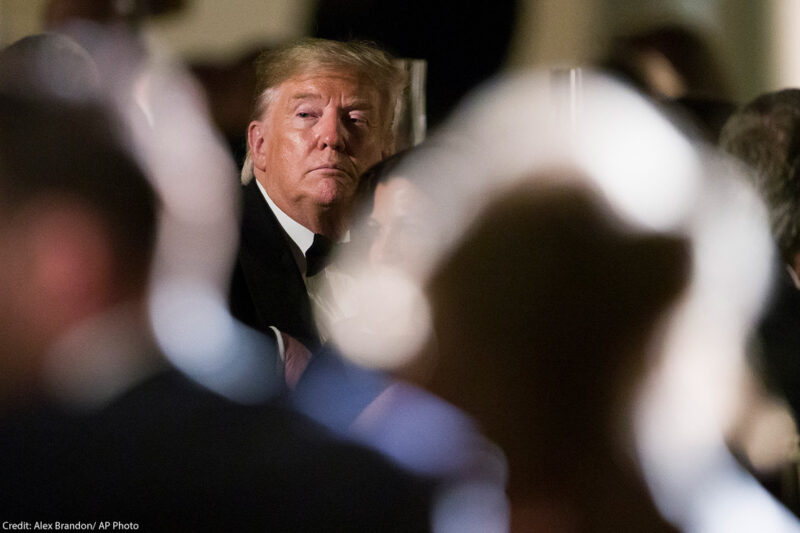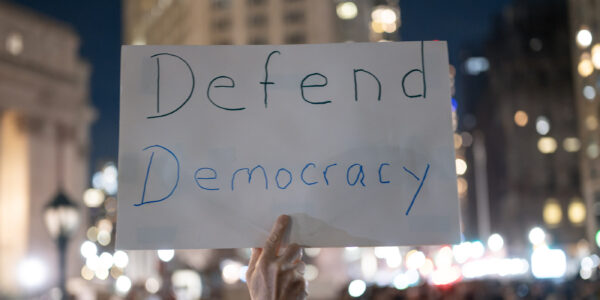The White House's Dangerously Expansive Views on Trump's Powers That You Can't See


A basic legal consensus about our democracy is that the Constitution assigns the "power of the purse" to Congress. Turning this edict on its head, White House Office of Management and Budget (OMB) lawyers reportedly concocted a legal theory that President Trump can override Congress's foreign policy spending decisions enshrined in law. If such a dangerously expansive proposal exists as a full legal opinion, it should be publicly disclosed — but chances are, it'll stay secret for a generation unless Congress intervenes.
To recap, the president tried to withhold congressionally-mandated military aid to Ukraine, while cutting Congress out of the process, to force an investigation into one of his political opponents. Overshadowed by the ensuing impeachment firestorm were concerns that the president had violated appropriations law, the Impoundment Control Act, and the legislative branch's constitutional primacy over spending. Perhaps mindful of the resulting legal red flags, including those raised by Pentagon officials, White House attorneys manufactured a legal justification. As reported, they claimed the president "could do so ... if he determined that, based on existing circumstances, releasing the money would undermine military or diplomatic efforts." Trump would purportedly just need to invoke "constitutional commander in chief powers."
Trump is not the first president to assert expansions of executive power or dispute Congress' funding mandates, although he is unique in absurdly claiming that the Constitution gives him "the right to do whatever I want." It's also not the first time Trump encroached on legislative control over the budget and flouted appropriations statutes. Last year, the ACLU went to federal court to challenge the president's unlawful diversions of public money to fund a border wall.
But the White House's legal justification for Trump's Ukraine aid machinations is a new, potentially more far-reaching and alarming twist. Depending on the details of the White House's legal analysis, which has not been officially confirmed or disclosed, such an extraordinarily broad power grab set as precedent could gut the separation of powers and upend our constitutional order. A maximalist version could even foreclose Congress's ability to check presidential overreach and fulfill basic duties involving matters of war and peace, including conducting oversight through appropriations laws and establishing spending priorities. What Congress enacted wouldn't matter under the worst-case scenario because the president could unilaterally ignore or nullify it. It's an especially galling argument with respect to military funding, as the Constitution explicitly allocates that authority to Congress.
That's why the public should be able to review the complete content of what the White House lawyers authored. However, a key obstacle is how the Freedom of Information Act (FOIA) works today. FOIA is the mechanism by which Americans can ordinarily obtain government records; in fact, the law presumes that any government document is public unless covered by one of its narrow exceptions. But if faced with a FOIA request for the new legal theory, the administration is likely to hide it behind a particular exemption. (Unlike other parts of the White House, OMB is subject to FOIA.)
Specifically, FOIA Exemption 5 allows the government to choose to withhold (or release) certain "inter-agency or intra-agency memorandums or letters" and includes the so-called "deliberative process privilege," which no longer shields records 25 years or older due to recent reforms. This ostensibly allows government employees to engage in candid internal conversations during the decision-making process. In practice, Exemption 5 is notorious for overuse and abuse, fueled by recent pro-secrecy court rulings. It's been invoked to conceal even the titles and publication dates of the Department of Justice Office of Legal Counsel's final and binding legal opinions — a form of secret law, which has no place in a democracy and was one of the evils that FOIA was intended to prohibit.
In the Ukraine scandal, the administration already invoked Exemption 5 to make suspicious redactions. Seizing a rare opportunity to compare those redactions to unredacted emails, Just Security uncovered the censorship of crucial excerpts questioning the legality of the White House's actions, thereby painting a misleading picture — even though FOIA cannot be used to conceal governmental misconduct. So it would be unsurprising if the administration sought to shield the White House's new legal theory behind Exemption 5. It's possible the courts would be skeptical because it doesn't protect post-decisional records and news reporting suggested that the legal justification came after the decision was made to withhold the military aid. That said, we cannot count on the courts to save the day, especially when the executive branch invokes foreign policy or national security interests.
Congress must intervene to reform the FOIA exemptions on behalf of the public, not just access the White House's legal theory for itself. Such amendments would be timely because as the Ukraine scandal shows, the president's attempts to usurp Congress's power of the purse and the broader problem of "secret law" are both ongoing issues. There are many good ways to update FOIA; one idea to consider, for example, is a new Exemption 5 balancing test to require agencies and reviewing courts to weigh the public's interest in transparency against an agency's interest in secrecy. In order for FOIA to truly and fully deliver on its promise of a transparent and accountable government, the legislature must act.


